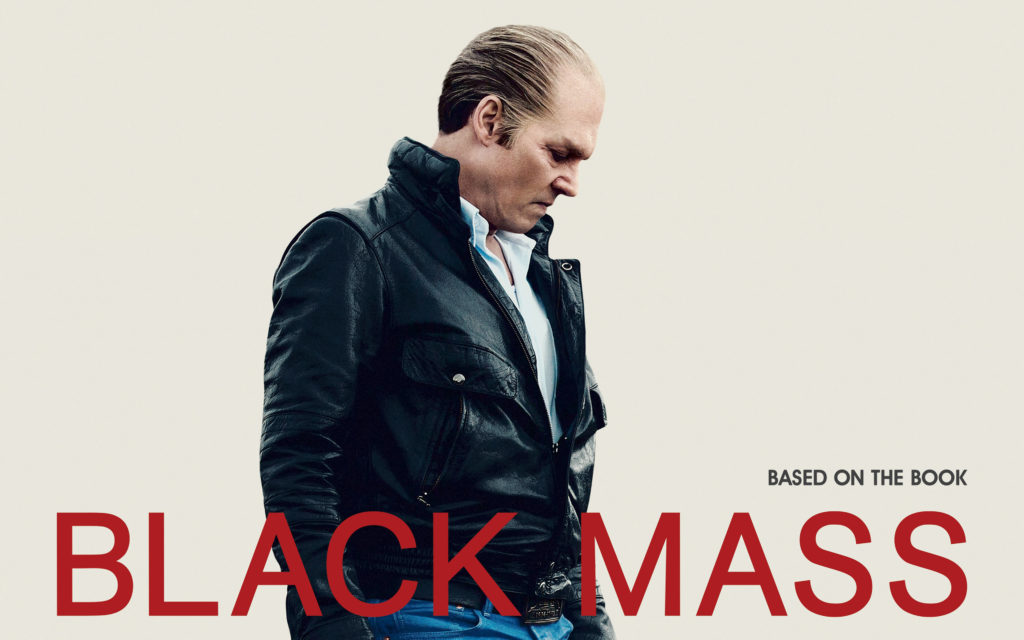Last updated on May 15, 2016

Black Mass sounds like an intriguing concept for a film, especially for someone who actually live near Boston (and, possibly, might have tangential connections to the story in question). James “Whitey” Bulger was one of the most notorious criminals ever to walk the face of Boston, if not the United States. The big question, though, was always: how did this violent, psychopathic, LSD-addled thug become a crime lord even in the face of much more organized competition?
Good question, and one that has an answer you probably don’t want to hear: the United States government helped him, willingly or not. Specifically, FBI Agent John Connolly (whom Whitey knew as a kid) and Whitey’s brother state senator William Bulger created an environment for his illegal activities to continue. Both covered his mess to the prevailing authorities, the former due to the possibility of taking down the mob, and the other because…well, they’re family. Thus, we get the sense that a combination of factors – Bulger’s natural charm, the sense of Boston loyalty on the streets, and the mythology around him, plus some powerful friends – let him become far more than some guy that randomly murders people. Of course, that’s all he really does in this film, but I’m sure that’s intentional.
The problem is, all these actors have no place to go with this very procedural script. Really, the main characters of the piece are Connolly (played by Joel Edgerton) and William Bulger (played by Benedict Cumberbatch, who somehow pulls off a Southie accent). Neither really appear enough to justify the paycheck, not to mention the vast numbers of character actors who flit in and out of the film. The two I mentioned in particular, though, really start all the events that take place in the film. We should receive a lot of focus as to what motivated them to allow Whitey to run roughshod, but we don’t. The loyalty both men have to Whitey seems, at least from an audience perspective, superficial. It’s never explained in any way, other than…money? But there’s nothing to intrigue us to ask any questions, and the film doesn’t demonstrate any deep thoughts on the matter either.
Even Depp, who goes the full “make up” route to accurately portray Whitey’s appearance, feels totally wasted here. We don’t get a sense of who, exactly, is the catalyst for all of this carnage and horrific violence – we, as the audience, only get to see Whitey murder some people. There’s no angle here other than the bare facts of the case – i.e., Whitey did X or Y – and that’s a bit of a shame. I could simply read this information in a book, because the film doesn’t add a new angle, a new perspective, to the story. I’m not doubting that it is, in fact, interesting, but I have no reaction to it because I lack any emotional investment in it.
Just to give you one example: we’re told that Whitey does a lot of things. Specifically, we’re told that he “rules” Boston, at least its criminal underbelly, during a certain point in the film. He runs drugs, he gets people hooked, and he employs every single illegal money-making activity under the sun. But, the film never shows us any of this. We only get to see the murdering, for whatever reason, as if this alone constitutes the whole of the man’s reputation. And sure, I’ve not seen more visceral murders in a movie in a long time (it’s pretty horrific), but I have no sense of the context beyond that. There’s too much telling rather than showing, as if they wanted to fit too much stuff into a two hour run time.
This is the same reason why I don’t think Whitey is the main character: he appears as a ghoulish specter who kills people indiscriminately in every other scene in which he appears. People look on as he murders other people, and they look genuinely disturbed. I suppose they tried to give us a hint that these people were taken in by Whitey’s charismatic nature (including Connolly), but we never see that conversion process in any detail. Whitey Bulger, to us moviegoers, barely gets any humanizing except in the first twenty minutes of the film (with his son and his wife), and even then it feels perfunctory – as if they didn’t even want to include this stuff at all!
I guess that’s where I found Black Mass (which I’m guessing refers to some religious symbolism about Whitey killing so many people, but your guess is good as mine) incredibly disappointing. It fails to get us into the head of the characters, or to actually identify a protagonist in this group of very unlikeable people, or even give many of the characters much to do. It follows too large of a time period (1975-1995) and tries to cover the entirety of Whitey’s post-Alcatraz crime career in a very short period, and so we only get sketches rather than any sense of focus. Even with Depp really going for broke with his performance, the surrounding elements of Black Mass just don’t give that performance any weight.
I almost feel bad for Johnny Depp. He’s really a great actor, but he just hasn’t found a film that totally plays to his strengths. This one, unfortunately, isn’t it.
